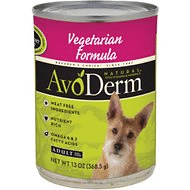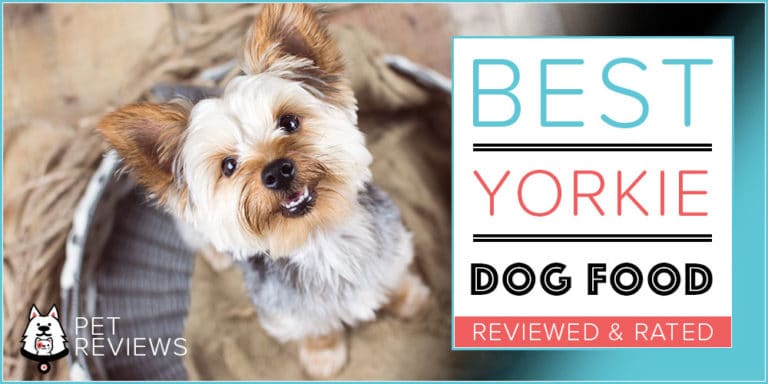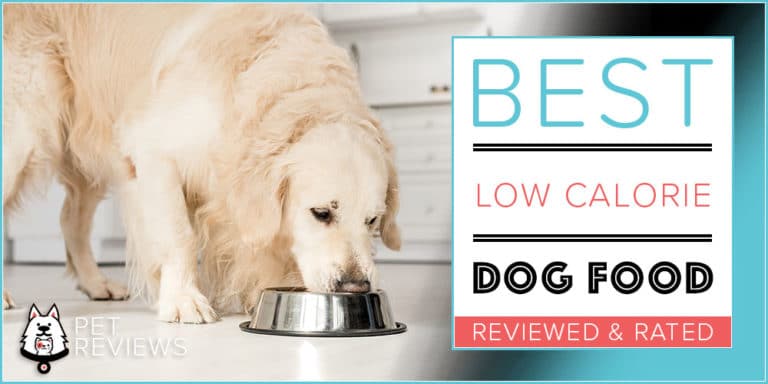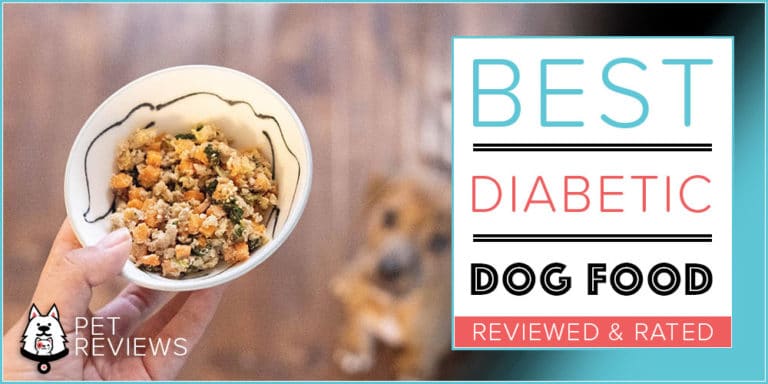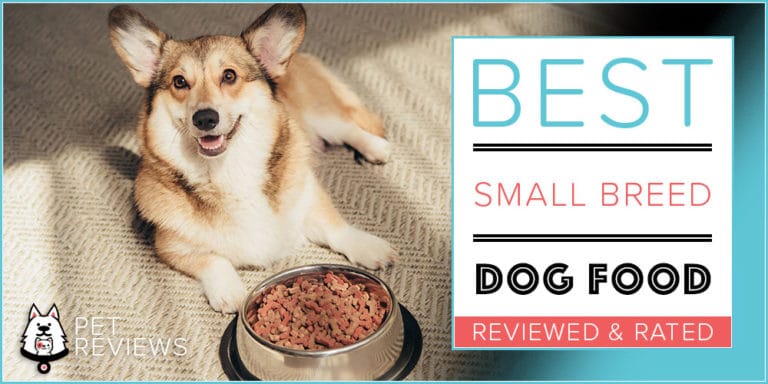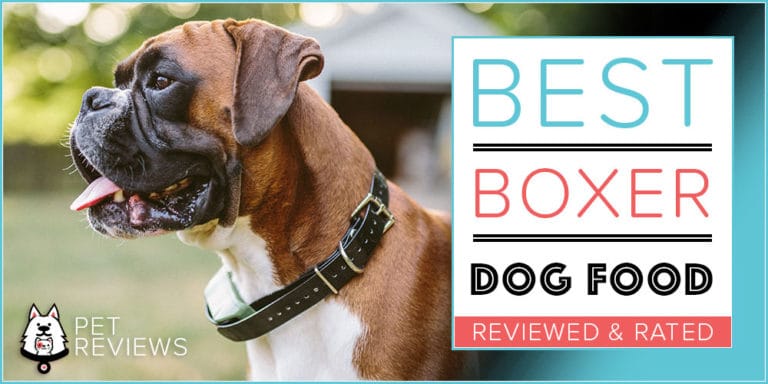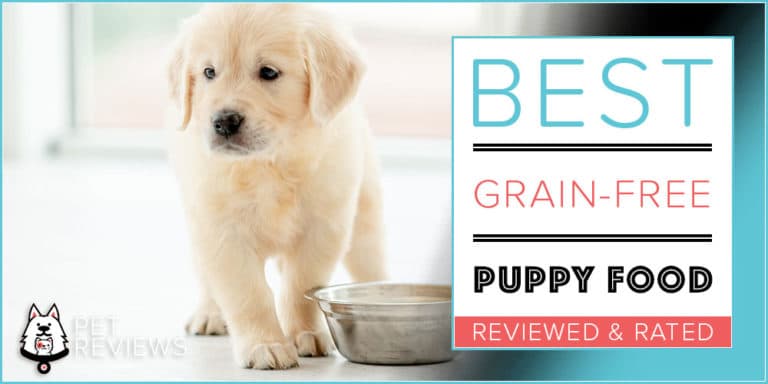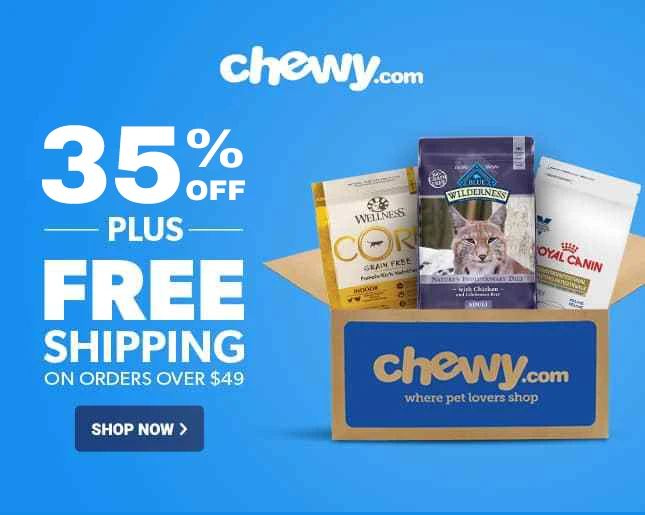10 Best (Healthiest Options) for Vegan Dog Foods in 2024
Scientific research shows that plant-based diets are extremely healthy for humans. Not only are they lower in fat and calories than the traditional Western diet, but they are very nutrient-dense. A wholesome, natural diet is essential for health and wellness in humans and in dogs. But can dogs eat a plant-based diet, and what does that look like?
The vegan/vegetarian movement has gained a great deal of popularity in recent years, and many pet owners are starting to put their dietary views into the decisions they make for their pets. Before switching your dog to a vegan diet, however, you should do some research to understand the pros and cons of this decision and to learn how to do it correctly. Your dog’s health is always the priority, so make sure whatever diet you feed him provides for his nutritional needs.
Before you switch your dog’s diet, it is important to understand the options. In this article, we’ll take a closer look at vegetarian and vegan diets for dogs. We’ll also provide some simple tips for choosing the best vegan dog food and give you our top 10 picks.
What is the Best Vegan Dog Food?
What Do You Need to Know About Vegan Diets for Dogs?
When you think about a wolf’s diet, you probably think of meat. Wolves are natural predators that catch and eat their kill. Though they are primarily carnivorous animals, they have been known to eat plants when other food is scarce, and they also consume some carbohydrates in the stomach contents of their prey. They are different from cats, however, which are obligate carnivores – this means that the majority of their diet must come from animal sources in order for their bodies to digest it properly.
The first question that needs to be addressed is whether a dog can survive on a vegan diet. The simple answer is yes, it is possible.
To answer this question in greater depth, there are a few things to consider. First and foremost, nutrition. Your dog requires certain nutrients in specific amounts to maintain his health and wellness. As long as those needs are met by plant sources, it is technically possible for a dog to survive on a vegan diet. The main issue is that plant sources for things like protein and fat are less biologically valuable than animal sources – your dog’s body is optimized to digest and utilize nutrients from animal sources more efficiently than plant sources.
The other question is whether your dog’s body is adapted to a plant-based diet. Aside from the issue of digesting and absorbing nutrients from plant sources, can your dog eat a plant-based diet? If you take a look at the biological requirements for an animal to follow a plant-based diet, you’ll see that dogs have some similarities. For example, they have both sharp canine teeth to tear meat and flat-surfaced molars that can be used to grind bone as well as plant material. Dogs also have a small intestine that accounts for about 23% of their gastrointestinal volume, which is consistent with other omnivorous species.
Just because your dog could technically survive on a vegan diet, however, doesn’t mean that it is the best choice. There are two primary reasons a dog owner might switch their dog to a vegan diet:
-
-
- Personal ethics and preferences (by the dog owner)
- Food allergies or sensitivities (on the dog’s side)
-
alert type=”warning” icon-size=”normal”] Food allergies in dogs are not as common as the pet food industry would have you think, but the ingredients to which dogs are most frequently allergic are generally animal proteins like chicken, beef, and pork. If your dog is allergic to one or more common proteins, you still have options for dog foods made with novel proteins, but you could still consider a vegan diet if your dog’s allergies are severe. [/alert]
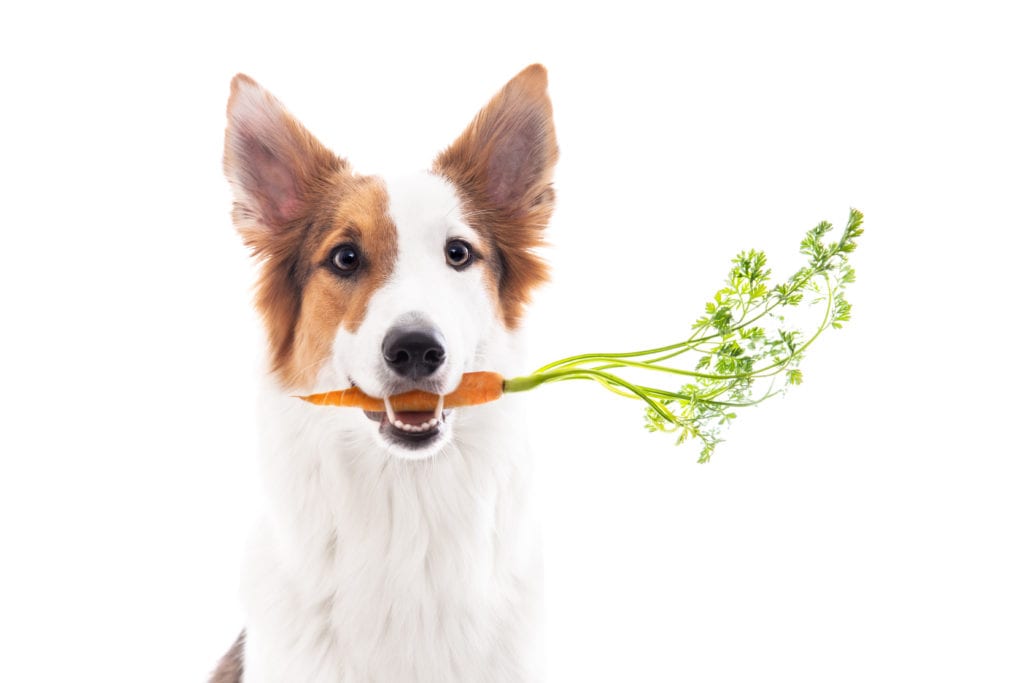
What About Homemade Vegan Diets?
If you’re concerned about the ingredients that go into your dog’s diet, you may be considering homemade dog food. Homemade dog food can be great for your dog because it is prepared fresh from whole-food ingredients. The challenge is making sure that it is complete and nutritionally balanced – you need to use a recipe approved by a veterinarian or pet nutrition expert. When it comes to finding a balanced vegan dog food recipe, the options may be more limited.
Here are some things to keep in mind before feeding your dog homemade food:
-
-
- Do your research ahead of time to find a recipe that is veterinarian-approved and nutritionally balanced for your dog’s size and life stage.
- Choose your ingredients wisely – fresh is best, so be prepared to purchase ingredients on a weekly basis.
- Make sure to properly clean your vegetable and fruit ingredients – any trace of pesticide could be harmful to your dog.
- Follow the recipe as closely as possible, paying attention to which parts of each ingredient you should be using (ex: peeled versus unpeeled carrots).
- Avoid swapping out ingredients unless the recipe offers options – swapping an ingredient could change the nutritional content of the recipe.
- Use a food scale to measure instead of cups – it is much more accurate.
- Add the necessary supplements to ensure that the recipe is complete and balanced for your dog.
- Be prepared to spend more on a homemade dog food diet than you would on kibble – if you can’t commit to it long-term, don’t make the switch.
-
If you have your heart set on feeding your dog a vegan diet, you should be prepared to take a significant amount of time to research the diet. Finding a balanced vegan dog food recipe can be a challenge, you may want to make it easier on yourself and buy vegan dog food that is already nutritionally balanced and ready to feed. Keep reading to learn what to look for when you’re ready to buy vegan dog food.
What to Look for in a Good Vegan Dog Food
Shopping for dog food can be a challenge because there are so many different options out there. When it comes to vegan and vegetarian dog food, however, the options are more limited. This doesn’t necessarily make your job any easier, however, because you still need to know what to look for in the best vegan dog food so make sure you choose a product that is right for your dog.
Here are some things to look for in a good vegetarian or vegan dog food:
-
-
- Wholesome, natural ingredients. To maximize the digestibility of your dog’s plant-based diet, make sure to choose a recipe made with natural, whole-food ingredients.
- Plenty of plant protein. Vegan puppy food should contain at least 22% protein and adult dog food at least 18%. Some of the richest sources of plant protein include peas and legumes.
- Balance of omega fatty acids. Your dog requires a blend of omega-3 and omega-6 fatty acids in his diet for healthy skin and coat. Look for a blend of these fats from plant sources.
- Digestible carbohydrates. The digestibility of your dog’s diet is key, so make sure any grains included in the food are whole grains or if your dog is sensitive, starchy veggies and legumes.
- Complete and nutritionally balanced. Most commercial dog foods include vitamin and mineral supplements to ensure nutritional balance. Make sure the vegan dog food you choose contains the necessary nutrients, keeping in mind that chelated minerals are the best.
-
Now that you know more about your dog’s nutritional needs, you’re ready to start shopping for the best vegan dog food. Keep reading to see our top 10 picks.
The 10 Best Vegan Dog Foods
| Our 2024 Picks: Best Vegan Dog Foods | |||
V-Dog Kinder Kibble Vegan Adult Dry Food
|
CHECK PRICE | ||
Natural Balance Vegetarian Formula Dry Food
|
CHECK PRICE | ||
Nature’s Recipe Healthy Skin Vegetarian Recipe Dry Food
|
CHECK PRICE | ||
PetGuard Organic Vegan Formula Canned Dog Food
|
CHECK PRICE | ||
Halo Holistic Garden of Vegan Recipe Dry Food
|
CHECK PRICE | ||
Whether you’re looking for vegan puppy food or an adult dog food diet, make sure to choose one that is high in quality and packed with nutrition. If you’re not sure where to start, consider some of the brand we’ve reviewed here. Here’s our top pick for the best vegan and vegetarian dog food:
Overall Best Vegan Dog Food: V-Dog Kinder Kibble Vegan Adult Dry Food
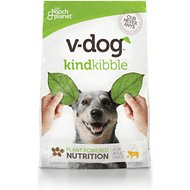
If you’re looking for a vegan dog food brand you can trust, V-Dog definitely deserves a spot on the list. This brand uses the tagline “For Pooch and Planet” because their products are just as good for the planet as they are for your dog. This particular recipe features a rich blend of vegan ingredients to deliver wholesome, natural nutrition in a balanced and digestible form. This recipe features whole-food ingredients like peas, lentils, quinoa, and brown rice without any low-quality grains or fillers like corn, wheat, and soy. It is supplemented with optimal levels of essential amino acids and provides a rich blend of omega fatty acids to support your dog’s skin and coat health. Overall, it provides 24% protein and 9% fat with 5% fiber at 363 calories per cup. Most dogs transitioned easily on to the diet, though there are always comments about some dogs having trouble transitioning on to plant-based dog food.
Pros: Natural whole-food ingredients, rich in protein (24%), highly digestible ingredients, blend of omega fatty acids for skin and coat, supplemented for balanced nutrition, no fillers or low-quality grains
Cons: Some dogs developed upset stomach after eating
Most Popular Vegan Dog Food: Natural Balance Vegetarian Formula Dry Food
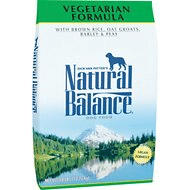
Shopping for dog food can be tough, so if you’re struggling to find the best option, you can always consider a popular brand like Natural Balance. This dog food brand is known for providing a wide variety of limited ingredient diets, but they also offer a vegetarian formula. This particular recipe features brown rice, oat groats, and barley as the top three ingredients, all of which are power-packed with nutrition. For healthy fats, this recipe contains canola oil to deliver 8% crude fat and essential fatty acids needed for skin and coat health. This formula contains a variety of supplemental fibers for healthy digestion as well as fresh fruits and vegetables to supplement the synthetic vitamins and minerals needed to ensure complete and balanced nutrition. It also contains plenty of zinc and manganese to support bone and joint health with DHA and EPA for healthy brain function.
Pros: Digestible whole grains, rich in healthy fats, supplemental fiber for healthy digestion, fresh fruits and vegetables, DHA and EPA for brain function, zinc and manganese for hip and joint health
Cons: Some dogs had trouble tolerating this food
Most Affordable Vegan Dog Food: Nature’s Recipe Healthy Skin Vegetarian Recipe Dry Food
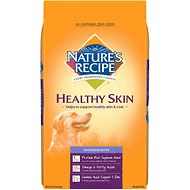
When it comes to feeding your dog, you should choose the highest quality product you can consistently afford. The better your dog’s diet, the more nutrient he’ll get and the healthier he will be. Just because a dog food is expensive doesn’t necessarily mean it is good, however, and there are affordable recipes out there that offer good nutrition. This Nature’s Recipe Healthy Skin Vegetarian Recipe Dry Food is an affordable option in plant-based dog food that offers decent quality. Formulated for dogs who are allergic to meat proteins, this recipe relies primarily on rice and soybean meal to deliver both energy and plant-based protein. It contains plenty of omega-6 fatty acids for healthy skin and coat without the use of corn, wheat, or artificial additives. It is definitely not the best recipe on this list in terms of quality ingredients, but it is an affordable option and does contain the nutrients your dog needs.
Pros: Contains fresh fruits and vegetables, rich in omega fatty acids, plenty of fiber for healthy digestion, chelated mineral supplements, 22% protein, only 303 calories per cup
Cons: Some dogs had trouble tolerating this food, contains some soy products, some ingredients could be better quality
Best Wet Vegan Food: PetGuard Organic Vegan Formula Canned Dog Food
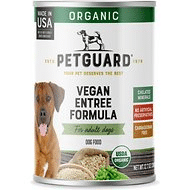
Some dogs simply prefer wet food to dry food because it is more palatable and higher in moisture. Many wet dog foods are also higher in animal protein than dry food, but vegan dog food is the exception to this rule because it is made entirely from plant-based materials. This formula features USDA-certified organic fruits and vegetables to deliver a healthy dose of antioxidants, vitamins, and minerals for balanced nutrition as well as a rich blend of omega-3 and omega-6 fatty acids for healthy skin and coat. It contains no corn, wheat, or soy ingredients and no dairy products either. This recipe is 100% free from artificial flavors, colors, and preservatives, plus it contains no carrageenan. All ingredients used in this recipe are ethically sourced, and the food is proudly made in the USA. Plus, it is endorsed by veterinarians and animal nutrition experts to ensure that your dog gets the best of the best in his diet.
Pros: USDA-certified organic fruits and vegetables, rich in omega-3 and omega-6 fatty acids, no corn or wheat ingredients, no artificial additives, free from carrageenan, all ingredients are ethically sourced
Cons: May be too high in calories for some dogs (follow feeding instructions)
Best Vegan Food for Dogs with Allergies: Halo Holistic Garden of Vegan Recipe Dry Food
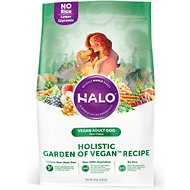
The best diet for a dog is one made from wholesome, natural ingredients and that’s exactly what this recipe delivers. It is designed to deliver holistic nutrition, meaning that it only contains ingredients that are good for your dog and nothing that could be harmful. It is packed with vitamins, minerals, and antioxidants to ensure that your dog gets all the nutrients he needs and nothing else. This Halo Holistic Garden of Vegan Recipe Dry Food features a rich blend of chickpeas, non-GMO vegetables, and healthy plant oils to deliver balanced nutrition of the highest quality. It also contains blueberries, carrots, cranberries, and sweet potatoes as superfood sources of essential nutrients, supplemented as needed for balanced nutrition for all life stages. Overall, it provides 20% protein, 10% fat, and 386 kcal/cup.
Pros: Holistic natural recipe, non-GMO ingredients, made in the USA, completely free from animal ingredients, great for sensitive stomachs, fresh fruits and veggies for natural sources of nutrients
Cons: Expensive to feed as a staple diet, some dogs won’t eat it
5 More Top-Rated Vegan Dog Foods
If the dog foods reviewed above don’t seem like the perfect fit for your dog, don’t worry – there are still plenty of other options out there! Here are four more top-rated vegan dog foods we recommend:
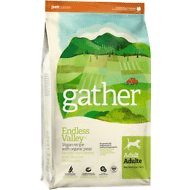
High-quality nutrition is essential for every dog, and it comes from wholesome, natural ingredients. This Gather Endless Valley Vegan Dry Dog Food is a great example if a high-quality vegan diet for dogs because it features premium organic ingredients in a balanced formula. This dog food lists organic peas, organic barley, and organic oats as the top three ingredients, all of which are highly nutritious and digestible. This recipe contains plenty of fiber for healthy digestion with a rich blend of omega fatty acids to support your dog’s skin and coat. It contains fresh fruits and vegetables to deliver natural sources for key vitamins, minerals, and antioxidants, which are supplemented to ensure complete and balanced nutrition. Overall, this recipe provides 22% protein and 11% fat with 385 kcal/cup.
Pros: High-quality organic ingredients, highly digestible, fresh fruits and vegetables, rich in fiber for healthy digestion, blend of omega-3 and omega-6 fatty acids, chelated minerals
Cons: Very expensive to feed as a staple diet
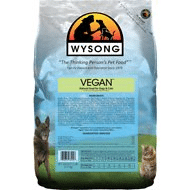
The Wysong brand is known for producing specialty diets for dogs and cats. This Wysong Vegan Dry Dog & Cat Food is a great example of a high-quality plant-based diet for dogs that also doubles as a vegan cat food. It features high-quality ingredients like brown rice, flaxseed, and coconut oil as well as a variety of seeds, fruits, and vegetables to deliver a balanced diet. This recipe contains a full 26% protein, which is higher than many vegan dog foods with 10% fat for healthy energy. This recipe contains a blend of omega fatty acids for healthy skin and coat, plus plenty of fiber for healthy and regular digestion. It contains probiotics as well as vitamin and mineral supplements to ensure complete and balanced nutrition for dogs and cats in all life stages.
Pros: Formulated for dogs and cats, rich in protein (26%), blend of omega fatty acids for healthy skin and coat, fiber and probiotic supplements, dried fruits and vegetables, complete and balanced
Cons: Contains some soy products, contains added sweetener
If you prefer to feed your dog wet food, this AvoDerm Natural Vegetarian Formula Canned Dog Food may be a good option. The AvoDerm company uses only the highest quality, natural ingredients and each recipe features the healthy fats found in avocado. This recipe uses only healthy, natural ingredients to provide the ideal balance of protein, fat, and essential nutrients for adult dogs following a plant-based diet. It contains a blend of fresh fruits and vegetables to deliver natural sources for key vitamins, minerals, and antioxidants with supplements as needed to ensure complete and balanced nutrition. With avocado as a main ingredient, this recipe is rich in omega-3 and omega-6 fatty acids to support your dog’s skin and coat health. It also contains chelated minerals and supplemental fiber.
Pros: Fresh fruits and vegetables, rich in omega-3 and omega-6 fatty acids, chelated minerals supplements, highly digestible, high-quality natural ingredients
Cons: Contains some soy ingredients, contains carrageenan as a thickener
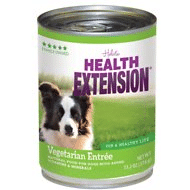
Formulated specifically for dogs with food sensitivities, this Health Extension Vegetarian Entrée Canned Dog Food is a healthy and natural choice. This formula features sweet potatoes and butternut squash as the first two ingredients with brown rice and carrots as supplemental sources of fiber and carbohydrate energy. This recipe contains fresh fruits and vegetables to provide natural sources for key vitamins and minerals, though you’ll also find all of the necessary supplements to ensure complete and balanced nutrition. This food is very rich in moisture, which increases digestibility and palatability, plus it is rich in fiber to ensure healthy and regular digestion. Overall, this formula provides a minimum of 7% protein, 2% fat, and no more than 3% fiber by volume and provides 276 calories per can.
Pros: High-quality natural ingredients, fresh vegetables as main ingredients, digestible brown rice, fresh fruits for nutrients, rich in fiber for digestion, complete and balanced
Cons: Could be higher in protein
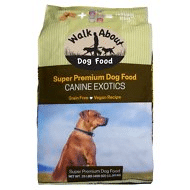
Though you may not have heard of the Walk About brand before, it is one worth considering if you’re looking for a vegan diet for dogs. This Walk About Canine Exotics Vegan Recipe Grain-Free Dog Food is packed with essential nutrients from high-quality, natural sources like peas, sweet potatoes, and lentils. It provides a total of 21% protein and 8% fat, which is the ideal ratio for most adult dogs. It contains a rich blend of omega-3 and omega-6 fatty acids to support your dog’s healthy skin and coat, plus it is supplemented with vitamins and chelated minerals to ensure complete and balanced nutrition. Chelated minerals are supplements bound to protein molecules, which increases their absorption rate. This food is both grain-free and gluten-free, making it a great choice for dogs with food allergies or sensitivities, and it is made in the USA. This recipe also contains plenty of fiber for healthy digestion and provides 319 calories per cup, which is a moderate calorie content that works for most adult dogs.
Pros: Rich in fiber and healthy fats, high-quality natural ingredients, blend of omega-3 and omega-6 fatty acids, fiber for healthy digestion, moderate calorie content, highly digestible, chelated minerals
Cons: Fairly expensive to feed as a staple diet for adult dogs

Frequently Asked Questions
-
-
- How much should I feed my dog?
-
The amount you feed your dog depends on several factors. What you need to think about more than just how many cups of food to give your dog is how many calories he needs. Your dog needs a certain amount of energy to maintain essential bodily processes, a number that varies depending on his age, weight, and activity level. The best thing to do is choose high-quality dog food formulated for your dog’s breed size and/or life stage and follow the recommendations on the package.
-
-
- How often should I feed my dog?
-
Most adult dogs do well with two meals per day. Small-breed dogs and puppies burn calories at a higher rate than adult dogs, however, so you may need to add an additional meal for these dogs. Keep in mind that the amount of food recommended on a dog food package is the daily feeding – you’ll need to divide that amount into two or three meals, depending. If your puppy isn’t growing properly, or if your dog has a very fast metabolism, you might consider free-feeding – just keeping your dog’s food bowl full and letting him dictate how much he eats.
-
-
- What about dog food allergies?
-
Dog food allergies aren’t as common as the pet food industry would have you believe, but they do happen. Animal proteins like chicken, beef, and pork are some of the most common food allergens for dogs, as are things like wheat, corn, and dairy products. If your dog is allergic to a common animal protein, you can always try switching to a product made with a novel protein like venison or rabbit. If your dog is still allergic to these proteins, a vegan or vegetarian diet may be an option. To confirm your suspicions of a food allergy, switch your dog to a limited ingredient diet made with novel proteins and carbohydrates for at least 12 weeks. If all signs of the allergy disappear, you’ll know that one of the ingredients in your dog’s previous food was the problem.
-
-
- When should I switch my puppy to adult food?
-
Most veterinarians recommend switching your dog to an adult dog food after about 12 months. This is the time when most puppies have reached their adult size or, at least, when their growth starts to slow down. If you have a small-breed puppy, you may be able to switch sooner but keep in mind that small dogs have very fast metabolism, so the higher protein and calorie content of the puppy food might be good just to make sure your puppy is fully developed before you switch. For large-breed puppies, you need to control growth by limiting the fat and calorie content so, so you might need to wait longer than 12 months to make the switch.
-
-
- Is a grain-free diet good for dogs?
-
There’s a great deal of controversy surrounding grain-free dog food right now since the FDA has received many reports linking grain-free food to dilated cardiomyopathy in dogs. This is something to keep in mind when feeding your dog a vegan or vegetarian diet because peas and legumes are the primary protein used in these diets and are also some often ingredients most heavily implicated in these reports. No matter what kind of diet you choose to feed your dog, it is essential that you do your research to make the best possible choice.
If you’re concerned about your dog’s health, choosing a high-quality and nutritious diet is the best thing you can do. If you follow a plant-based diet yourself for health reasons, you might be considering the same for your dog. It is important to separate your own preferences, however, and to make a decision based on what’s best for your dog, not just what you choose to eat yourself.
If, with your veterinarian’s approval, you decide that a vegan or vegetarian diet is right for your dog, consider one of the brands reviewed above. We’ve provided a compilation of different vegan and vegetarian options so you can choose the one that best suits your dog’s needs and preferences. We wish you the best of luck!


